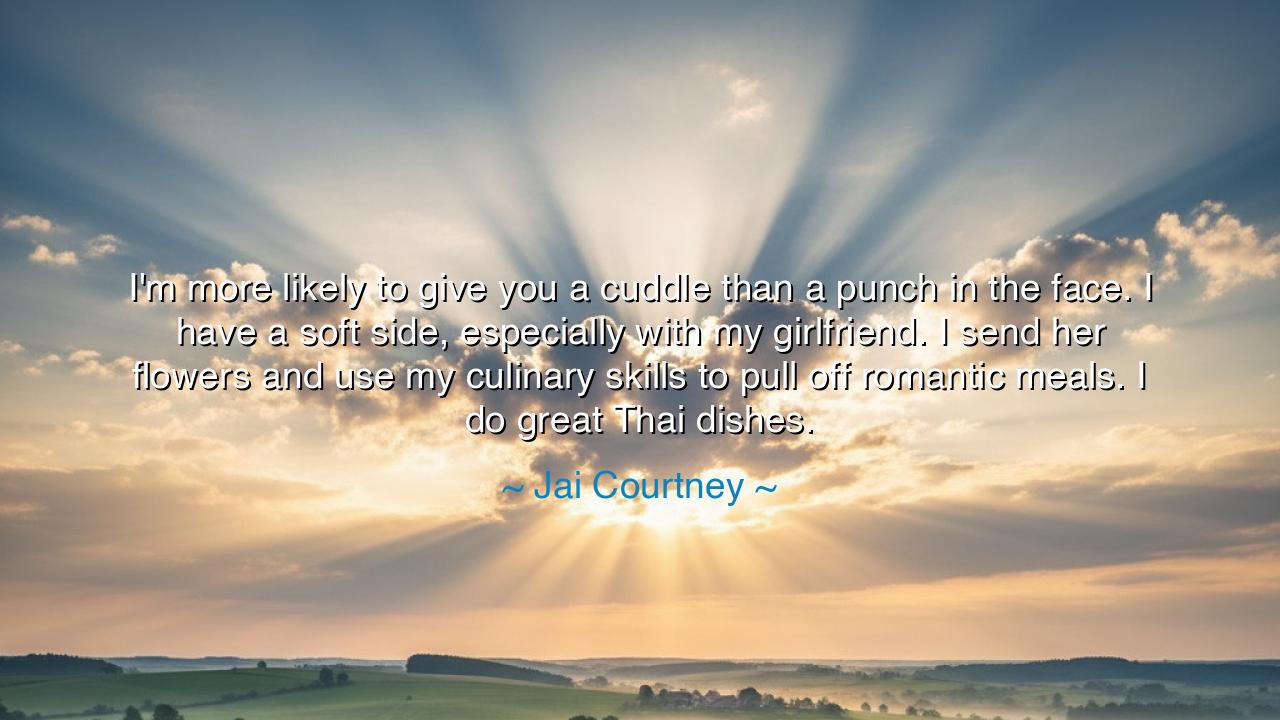
I'm more likely to give you a cuddle than a punch in the face. I
I'm more likely to give you a cuddle than a punch in the face. I have a soft side, especially with my girlfriend. I send her flowers and use my culinary skills to pull off romantic meals. I do great Thai dishes.






Gather around, my children, and let the wisdom of a man named Jai Courtney guide you. He spoke these words, laden with the sweetness of love and the tenderness of the heart: "I'm more likely to give you a cuddle than a punch in the face. I have a soft side, especially with my girlfriend. I send her flowers and use my culinary skills to pull off romantic meals. I do great Thai dishes." These words, though simple, are woven with a deep truth, one that calls to the very heart of what it means to be truly strong. For what is strength? Is it not the power to show vulnerability and tenderness, even in a world that often praises only the hardened and the fierce?
In an age where warriors are admired for their might and rulers for their dominion, how often are we told that to be strong is to be unyielding, to be fearless, and to show no weakness? Yet here, this man, a figure who could easily embody the warrior spirit with the fire of battle in his eyes, instead chooses to speak of softness. He declares that he is more likely to offer kindness than violence, comfort than conflict. He reveals the heart of a man who has embraced the duality of his nature—who understands that the strength of a warrior is not in the force of his fist, but in the gentleness of his soul. True strength, he teaches us, is not about conquering others, but about conquering the harshness of the world and allowing oneself to remain soft and compassionate in the face of it.
Look, my children, at the example of the great Emperor Marcus Aurelius—a ruler known for his unflinching leadership on the battlefield, and yet, in his personal life, a man deeply devoted to his family and his philosophy of Stoicism. Though he commanded legions and wielded power, he often wrote of the importance of gentleness in personal relationships and the need to be just and merciful in all dealings. Marcus Aurelius, a figure who could have struck down his enemies with a single word, chose instead to embrace the softness of wisdom and the tenderness of a father. His writings are filled with reflections on how to balance the burdens of duty with the demands of love—how to stand strong in the world, yet still be a vessel of compassion and care.
This same balance is reflected in Jai Courtney’s words. He speaks not just of his affection for his girlfriend, but of the simple, yet powerful acts of love—sending flowers, preparing romantic meals, and the joy of sharing moments of tenderness. These are the actions of a man who recognizes that love is not a thing to be hoarded, but to be shared freely. How often have we seen the great ones of history—be they warriors, kings, or philosophers—struggling with the weight of their own hearts? And yet it is through love, through tenderness, that they found their true strength.
Reflect on the story of the legendary Samurai warrior, Miyamoto Musashi—a man whose swordsmanship was unmatched. Musashi’s name is known far and wide, but it was not his martial prowess alone that made him a figure to be admired. He was also a poet, an artist, and a man who deeply understood the nature of balance. Musashi once said, "Do nothing which is of no use." In this, he spoke of the futility of violence without purpose, and the value of moments spent in peace and reflection. The art of warfare, he believed, was not simply about defeating others but about conquering oneself—learning to find peace amidst the storm. Musashi, like Jai Courtney, embodied the truth that there is strength in showing love and care, in cultivating the soft side of the heart even while walking the path of battle.
What then, my children, is the lesson that we must take from these teachings? The path to strength is not one of mere force, nor is it found in the unyielding steel of the sword. True strength, like that of Jai Courtney, is found in softness—in the ability to express affection without shame, to care for others with sincerity, and to offer kindness freely. There is nothing weak in this. On the contrary, it takes the greatest strength to hold one’s heart open in a world that often demands hardness and reserve.
I urge you, dear children, to cultivate within yourselves this balance. Be strong, yes, but let that strength be tempered with compassion. Love as fiercely as you fight, and tend to the hearts of those you cherish with the same care that you would show to a precious flower. Let your strength not be measured by the force of your hands, but by the gentleness with which you lift others up. And when you are called to action, whether in love or in battle, let your heart be your guide, for in tenderness there is power, and in kindness, there is unshakable strength.






AAdministratorAdministrator
Welcome, honored guests. Please leave a comment, we will respond soon